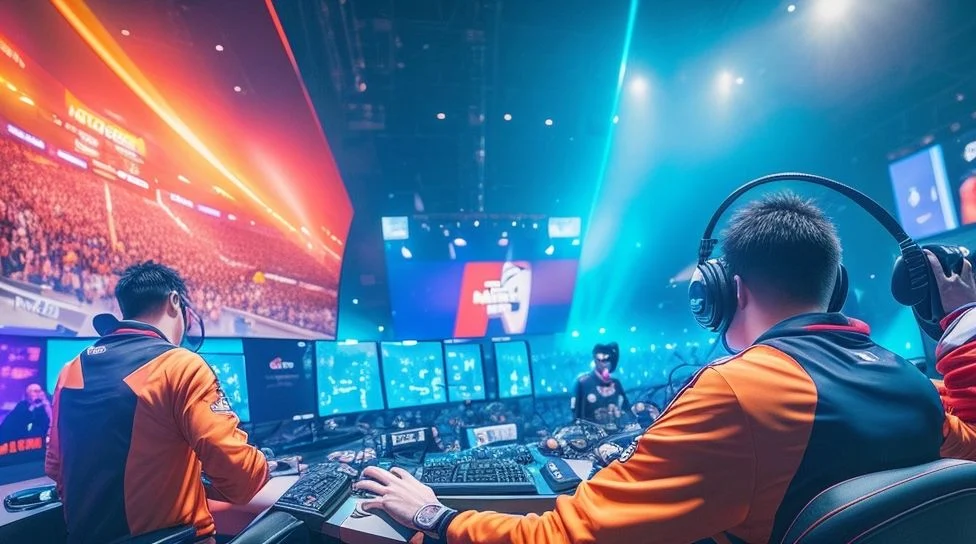Esports Explosion: How Competitive Gaming is Taking Over the World is a phenomenon that has been rapidly gaining momentum in recent years. Competitive gaming, also known as esports, has become a global sensation, attracting millions of fans and generating billions of dollars in revenue. Esports tournaments fill arenas with enthusiastic spectators, and professional gamers compete for huge cash prizes. The rise of esports has also led to the creation of professional leagues, sponsorships from major companies, and even college scholarships for talented gamers. This explosive growth has brought competitive gaming into the mainstream, captivating a diverse audience of all ages and backgrounds. As a result, esports has become a dominant force in the world of entertainment and sports, with no signs of slowing down.
The rise of competitive gaming, as detailed in Esports Explosion: How Competitive Gaming is Taking Over the World, has sparked curiosity and interest in the gaming community and beyond. The global phenomenon has piqued the fascination of not only gamers, but also investors, advertisers, and traditional sports organizations. The rapid evolution of esports has raised questions about its potential impact on traditional sports, as well as its influence on popular culture. Additionally, the growing popularity of competitive gaming has prompted discussions about the future of entertainment and the ways in which technology is reshaping our leisure activities.
The Rise of Esports
Esports, or electronic sports, have seen a dramatic rise in popularity in recent years. What was once considered a niche hobby has now become a global phenomenon, with millions of fans tuning in to watch professional gamers compete in tournaments and leagues. This rise can be attributed to several factors, including the increasing accessibility of gaming technology, the growth of online streaming platforms, and the development of organized competitive gaming leagues.
Esports has also gained mainstream recognition and legitimacy, with major corporations and traditional sports teams investing in esports teams and events. The industry has experienced rapid growth in terms of viewership, prize pools, and sponsorship deals, making it a lucrative career path for talented gamers. As a result, esports has become a significant player in the global entertainment and sports industries.
The Global Appeal of Competitive Gaming
One of the key factors driving the explosion of esports is its global appeal. Competitive gaming transcends cultural and language barriers, attracting a diverse and international fan base. This has been facilitated by the widespread availability of online gaming and streaming platforms, which allow fans from around the world to connect and engage with each other.
Furthermore, the competitive nature of esports makes it universally relatable, as viewers can appreciate the skill, strategy, and teamwork involved in professional gaming, regardless of their own gaming abilities. This global appeal has turned esports into a unifying force, bringing together people from different backgrounds and uniting them in their passion for competitive gaming.
The Evolution of Esports Tournaments
Esports tournaments have evolved from small, grassroots events to large-scale, professionally organized spectacles. Major gaming titles like League of Legends, Dota 2, and Counter-Strike: Global Offensive host annual world championships with massive prize pools, drawing in millions of viewers and creating intense rivalries among top teams.
These tournaments are not only significant for the players and teams involved but also for the gaming community as a whole. They serve as showcases of skill and sportsmanship, setting the stage for memorable moments and incredible displays of talent. The production value of these events has also skyrocketed, with elaborate stages, professional commentary, and high-quality broadcasting, further enhancing the experience for both live and online audiences.
The Professionalization of Esports
As esports has grown in popularity, it has become increasingly professionalized. Professional gaming teams now have coaches, analysts, and support staff, mirroring traditional sports organizations. Players are treated as athletes, with rigorous training regimens, dietary plans, and mental coaching becoming standard practice.
Additionally, the infrastructure supporting esports has expanded to include player unions, talent agencies, and specialized esports arenas. This professionalization has not only elevated the level of competition but has also made esports a more sustainable and viable career option for talented gamers, paving the way for a new generation of esports professionals.
The Integration of Esports into Mainstream Culture
Esports has begun to integrate into mainstream culture, with gaming personalities and esports events gaining recognition outside of the gaming community. Major brands, celebrities, and media outlets have taken notice of the growing influence of esports and have started to collaborate with esports organizations and sponsor gaming events.
Furthermore, esports has found its way into traditional sports venues, with tournaments filling stadiums and arenas typically reserved for physical sports. This crossover has introduced esports to audiences that may not have been exposed to it otherwise, further solidifying its position in mainstream culture.
The Economic Impact of Esports
The rapid growth of esports has had a significant economic impact, creating opportunities for job growth and revenue generation. Esports organizations, event organizers, and gaming-related companies have emerged, providing employment opportunities in various sectors, including marketing, event management, and content creation.
Furthermore, the influx of investments from sponsors and media rights deals has injected substantial capital into the industry. This has not only elevated the production value of esports events but has also increased the overall financial viability of the industry, making it an attractive investment opportunity for businesses looking to tap into the lucrative esports market.
The Challenges and Controversies in Esports
Despite its rapid growth, esports has faced its fair share of challenges and controversies. Issues such as player burnout, exploitation, and the lack of standardized regulations have surfaced as the industry continues to mature. Additionally, concerns regarding doping, match-fixing, and the inclusion of gambling have raised questions about the integrity of esports competitions.
Furthermore, the rapid expansion of esports has led to questions about its long-term sustainability and the potential oversaturation of the market. As the industry grapples with these challenges, it will be crucial to address them in order to ensure the continued growth and success of competitive gaming.
The Future of Esports
As esports continues to gain momentum, its future appears to be filled with potential and opportunity. The industry is expected to further professionalize, with increased regulation, player welfare initiatives, and standardization of practices. Additionally, the global reach of esports is likely to expand, with new regions and demographics becoming active participants in the esports ecosystem.
Furthermore, technological advancements, such as virtual and augmented reality, are poised to revolutionize the way esports is experienced, offering new dimensions of immersion and engagement for both players and spectators. With the continued support of fans, investors, and industry stakeholders, esports is well-positioned to solidify its status as a dominant force in the world of entertainment and competition.
| Topic | Description |
|---|---|
| What is Esports? | Competitive gaming at a professional level. |
| Popularity | Growing rapidly with millions of fans and viewers. |
| Global Reach | Competitions and players from all around the world. |
| Big Business | Millions of dollars in prize money and sponsorship deals. |
| Professional Players | Highly skilled and dedicated athletes. |
| Impact | Changing the way people view and participate in gaming. |



